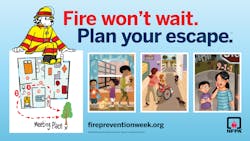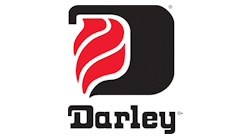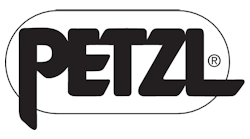Fire Prevention Week 2022 Keys on Home Escape
“Fire Won’t Wait. Plan Your Escape.” is the theme for the 2022 Fire Prevention Week (Oct. 9–15). The NFPA says that this reinforces the critical importance for civilians to develop a home escape plan with all household members and to practice it regularly. In addition, October 2022 represents the 100th anniversary of Fire Prevention Week.
“This year’s Fire Prevention Week campaign capitalizes on [the observance’s] milestone anniversary, celebrating all we’ve accomplished in reducing the public’s risk to fire over the past hundred years,” NFPA’s Lorraine Carli says. As well, the theme addresses remaining challenge, she adds.
According to NFPA data, the home is where people are at greatest risk, despite it being the place where “people feel safest from fire.” When a home fire does occur, it more likely is serious.
“Fire Won’t Wait. Plan Your Escape” promotes potentially lifesaving messages that can mean the difference between life and death in a fire. Developing a home escape plan with all of the members of a household and practicing it regularly ensures that everyone knows what to do when the smoke alarm sounds and uses time wisely. The key messages behind the theme are:
- Make sure that a home escape plan meets the needs of all family members, including those who have sensory or physical disabilities
- Smoke alarms should be installed in every sleeping room, outside of each separate sleeping area and on every level of a home; smoke alarms should be interconnected, so that when one sounds, they all sound
- Know at least two ways out of every room, if possible, and make sure that all doors and windows open easily
- Have an outside meeting place that’s a safe distance from the home, where everyone should meet
- Practice a home fire drill at least twice per year (once during the day and at night) with everyone who is in the household, including guests
To learn more, visit nfpa.org/fpw.
Illinois Metro Chiefs: Don’t Shortchange AFG
Organizers of the Metropolitan Fire Chiefs Association of Illinois’ 17th Annual Fire Services Home Day called on federal legislators to restore funding for the Assistance to Firefighters Grant (AFG) and the Staffing for Adequate Fire and Emergency Response (SAFER) programs at $750 million each for fiscal year 2023. As of September 2021, which is the most recent period of time for which data were provided, FEMA awarded $710 million for fiscal 2021.
Representatives from at least 50 Illinois fire service organizations gathered in Alsip, IL. they were joined by elected officials and staff personnel from numerous state and federal offices.
Paul Darley, who is the president and CEO of Darley and who co-chaired the event with retired Schiller Park Fire Chief Tom Deegan, said “Virtually all fire departments have been positively impacted as a result of funding from [the AFG and SAFER programs].”
“Our Home Day is when we meet senators, congressional representatives and staffers when they are home from Washington, D.C., Darley added.
The AFG appropriates funds to local fire departments through FEMA. Because of this program, departments of all sizes can purchase PPE, SCBA, personal alert safety system devices, fire apparatus, and other safety and response equipment.
HERO Act Passes the House
The U.S. House of Representatives passed the Helping Emergency Responders Overcome (HERO) Act. The bipartisan legislation that was introduced by Representatives Dr. Ami Bera (D-CA) and Brian Fitzpatrick (R-PA) seeks to provide critical mental health resources to U.S. first responders and health care providers. It was included in passage of the Restoring Hope for Mental Health and Well-Being Act.
The HERO Act directs the Secretary of Health and Human Services (HHS) to report to Congress each year on first responder suicide rates, including identifying risk factors, possible interventions and recommended interventions for further study. It also requires HHS to develop and distribute best practices on the prevention and treatment of post-traumatic stress among first responders.
“Our nation’s police officers, firefighters and EMTs risk their lives every day to keep our communities safe and protected,” Bera said. “Tragically, our first responders experience higher mental health stress and higher risk of suicide than many other professions. The HERO Act will give our first responders access to more mental health resources, more options for counseling, and encourage best practices to reduce the risk of suicide.”
The bill also creates two grant programs. The first is a program to train individual firefighters and paramedics to provide mental health support to their peers in their organization. The other grant would train health care providers to serve a similar role in their hospital and practice.
Verizon Frontline Commended by Boulder County
During the response to the Marshall Fire in December 2021, the Verizon Frontline Response Team provided emergency assistance/voice and data solutions to the incident at the fire as well as at the emergency operations center to provide additional LTE connectivity. In recognition of that work, the Boulder County, CO, Sheriff’s Office issued a Sheriff’s Commendation.
The fire destroyed more than 1,000 homes and burned more than 6,000 acres. The Verizon Frontline Response Team provided network extenders, wireless routers and in-building cellular repeaters as well as charging stations for residents.
For more, go to verizon.com/news.
Petzl Vertical-Environment Partnership Grows
Seven training organizations joined the Petzl Technical Partner (PTP) Network for 2022: Academy-Trained, Santa Rosa, CA; All Hands Fire Equipment & Training, Neptune City, NJ; Expert Safety Services, Bloomington, IL; Learn to Return Training Systems, Anchorage, AK; North American Training Solutions, Douglas, MA; Texas A&M Engineering Extension Service, College Station, TX; Tower Safety & Instruction, Phoenix; and Vector Rescue, Torrington, CT.
The PTP Program is said to formalize working relationships between Petzl and experts in vertical environments that contribute to the development of industry best practices.
“We do not have the depth of in-field and daily-use expertise of the many training companies that use our products,” John Piper, who is managing director of Petzl’s Professional Division, said. “Petzl’s vision is to partner with the most respected training companies to support their educational efforts and to deepen our understanding of these industries and their use of our PPE.”
Upcoming classes at Academy-Trained include aerial rescue and crane training. All Hands Fire Equipment & Training keys on developing and preparing custom training solutions. Expert Safety Services’ Window Cleaner Safety Program is approved by the International Window Cleaning Association. Learn To Return Training Systems specializes in fall protection and aviation crash survival (land and water), among others. North American Training Solutions prides itself on collaborating with customers to ensure compliance with industry standards. The Texas A&M Engineering Extension Service is internationally recognized for its delivery of emergency response, homeland security and workforce training. Tower Safety & Instruction is led by a former safety director in the wireless industry. Vector Rescue provides comprehensive technical rescue solutions that include initial training and ongoing team development.
Visit petzlsolutions.com for more information.
This Month in Fire History
July 1, 1988, Hackensack, NJ—Auto dealer fire kills five firefighters
July 4, 2002, Gloucester City, NJ—Residential roof collapse kills three firefighters
July 5, 1973, Kingman, AZ—Doxol Gas Western Energy Co. fire kills 11 firefighters
July 6, 1944, Hartford, CT—Ringling Bros. and Barnum & Bailey Circus tent fire kills 168
July 6, 1994, Glenwood Springs, CO—South Canyon Fire kills 14 firefighters
July 9, 1953, Mendocino National Forest, CA—Forest fire kills 15 firefighters
July 23, 1984, Romeoville, IL—Union Oil refinery fire kills 17; losses worth $177 million
July 24, 1931, Pittsburgh—Little Sisters of the Poor home for the aged fire kills 48
July 26, 1990—Americans with Disabilities Act passes, greatly affecting safety codes
July 28, 1945, New York City—Fire after B-25 crash into Empire State Building kills 14
July 29, 1956, Sun Ray, TX—Shamrock Oil & Gas refinery fire kills 19 firefighters
Courtesy: NFPA
Firehouse Staff
Content written and created by Firehouse Magazine editors.










